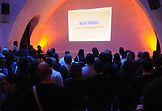
WHAT WE DO
01
Blockchain in Manufacturing
"FabRec"
We have created the first of its implementation of a decentralized approach to handle manufacturing information generated by various organizations using blockchain technology. This decentralized network of manufacturing machines and computing nodes can enable automated transparency of an organization’s capability, third party verification of such capability and automated mechanisms to drive paperless contracts between participants using ‘smart contracts’.
04
Interoperability in Factories
The implementation of smart manufacturing relies on back-and-forth industrial communications between the machine assets on the shop floor to the cloud-level information systems. In IIoT, data flow is not hierarchical since intelligence is added to the machine asset level. This project describes the implementation and test run of the MQTT Sparkplug-B protocol with conventional machining assets, with its data being streamed from the machine controllers to a shop floor network and further on to a cloud-based platform.

02
For decades, CAD software in use by design engineers have hardly changed. Tools such as extrude - revolve - loft and other modeling features allow us to build fairly complex 3D designs. What-if we could completely change the way we model 3D products - research algorithms that allow computers to assist humans in the design of products. Instead of humans instructing computers on what to do - could a more collaborative approach of augmenting human creativity be possible through computing tools.
03
This work builds a knowledge network graph that links 3D model information, manufacturing process keywords and manufacturing service companies. This information can include material assignment, material specifications, and service suppliers that can provide the material, required hardware, or the expertise to produce the part. This connected data is the foundation of MOKN, while also connecting to existing wider open data available in manufacturing textbooks, magazines, blogs and company websites.
05
Digital Twins in Manufacturing
Bioprinting is the process of automated deposition of biological molecules, such as living cells and associated biomaterials, to form a 3D heterogeneous construct. Currently, assessment of these critical biological quality attributes must be performed offline by subjecting the constructs to destructive assays that require staining and sectioning. This project supports fundamental research to enable predicting the quality attributes of the bioprinted constructs using a real-time characterization technique.
06
Smart Robots in Factories
We are working on automated mechanisms for a manufacturing services marketplace, Consumers name their own price and the mechanism will find service bureaus who are willing to make the part under the stated price. Consumers bid and the platform finds a service supplier able to match the stated bid price. The incentive for service providers is the opportunity to market their excess capacity to a deal conscious consumer at a lower price without cannibalizing their existing sales channels.
THE CREW

OUR STORY
Dr. Starly obtained his bachelor's degree in Mechanical Engineering from the University of Kerala, India. He immediately continued on to graduate school, completing his Ph.D. in Mechanical Engineering, with a focus on bio-additive manufacturing processes. His career path has led him to an Assistant Professor at the University of Oklahoma, School of Industrial Engineering and at NC State University where he focused much of his work on Additive Manufacturing, Reverse Engineering and Data Intensive Smart Manufacturing. In 2022, he moved to Arizona State University, to lead the School of Manufacturing Systems & Networks, one of the Ira A. Fulton Schools of Engineering at Arizona State University. He is among the world-wide experts in Smart Manufacturing through digitally enabled manufacturing. He invites you to learn more about the lab' activities and encourage your to read our research papers and project pages to help understand our work.

OUR VISION
DIME's lab vision is to empower manufacturing science researchers, engineers and educators to utilize data to improve the productivity, reliability and sustainability of manufacturing systems. These manufacturing systems span traditional computer numerical control (CNC), additive manufacturing systems and advanced biomedical manufacturing systems. We believe newer automation processes, particularly intelligent machines and cyber-physical manufacturing systems in manufacturing and design will lead to the next generation of personalized consumer and healthcare products. We intend to demonstrate a pilot to showcase automated data streams from machines into a manufacturing cyberinfrastructure, democratizing access to storage, computing and virtualization resources, federating data sharing from disparate manufacturing environments, while fostering the growth and innovation in the manufacturing research and technology community.
The team is made up of collaborating faculty members from North Carolina State University and outside the university. We have an aspiring set of doctoral, master's and undergraduate level students who are working towards several technologies spanning traditional manufacturing, additive and biomedical manufacturing. The students themselves are working towards their dissertations, thesis and short-term projects. If you are interested in being a member, please contact Dr. Starly. Several alumni from our laboratory have graduated and moved on to academia and industry. Their work is acknowledged as they progress towards their own career path.
Click Here to see current members of the DIME lab.

Our Products











